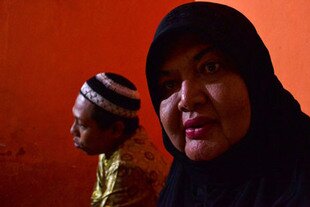Transvestites in Indonesia seek God in daily life
By Pradipta Lakshmi for Khabar Southeast Asia in Yogyakarta -- 31/01/12
January 30, 2012

Mariyani (in black headscarf), is a transvestite or 'waria' who quit the sex trade to become a hairdresser. She hosts a weekly prayer meeting and study group for waria to "provide a place where they can "feel safe and loved spiritually". [Photo by Pradipta Lakshmi]
For the past four years, Mariyani has been running a weekly Qur'an study group out of her home in Yogyakarta, Java. Every Sunday night, 15 to 20 people gather to read the Qur'an, study its teachings, and pray under the leadership of a local cleric.
In Indonesia, the world's most populous Muslim country, this might not seem out of the ordinary. However, the fact that Mariyani and all of the study group's attendees are transvestites makes the group very unique.
In Indonesia, male-to-female transgender people and transvestites are referred to as 'waria,' a mix of the Indonesian words 'wanita', meaning woman, and 'pria', meaning man. They are officially recognized on their identity cards by their original birth names and as male only.
While gender and sexual orientation is not specifically mentioned in the Indonesian constitution, which promises all citizens "the right of recognition…and equal treatment before the law," waria are legally classified as mentally handicapped or 'cacat' and therefore not fully capable adults.
![A cleric leads prayers at a private home in Yogyakarta. The group gathers weekly to study the Qur'an. In Indonesia, 'waria' are classified as mentally handicapped and often are subjected to harassment. [Photo by Pradipta Lakshmi]](/shared/images/2012/01/30/120131_PRADIPTA_ID_TRANS2-310_207.jpg)
A cleric leads prayers at a private home in Yogyakarta. The group gathers weekly to study the Qur'an. In Indonesia, 'waria' are classified as mentally handicapped and often are subjected to harassment. [Photo by Pradipta Lakshmi]
This means they can be subject to arbitrary harassment, summary arrest, and detention by the police, according to ARC International, a global LGBT (lesbian, gay, bisexual, and transgender) rights group founded in 2003.
Practicing their faith is difficult as well, as some Indonesian clerics refer to them as "'haram' (forbidden) or a 'disease of society,'" and generally restrict their attendance in mosques, especially if waria request to sit in the women's section, Mariyani said.
But thanks to local community acceptance of her Qur'an study group – and the help of one local cleric – Mariyani is spreading her message that God does not play favourites when it comes to who is entitled to enter heaven.
She said she is grateful to have neighbours who are tolerant and supportive of the study group.
"Most of them are Muslims and we respect and help each other," she said.
Many of the group's participants make their living as sex workers, but they incur no judgment during their time at Mariyani's.
"I'm very happy that they are willing to spare one night a week for this activity," said Mariyani, born Maryono, who quit working as a sex worker to be a hairdresser and makeup artist.
Mariyani, 52, said she is by no means trying to lure other waria to leave their professions as prostitutes, as she fully understands that there are only a few jobs available for male-to-female transgendered people and transvestites.
"They can't even get a job as a cashier in a supermarket unless they appear as a man, let alone expecting the government to give them a seat in the parliament," she said.
Today, the cleric in charge of the study group, Abdul Muiz Ghazali, has chosen belief and faith as its focus.
Ghazali has led the group for the past two years, ever since its former leader told a local newspaper "that he was in the process of leading us back to become real men", Mariyani said.
!['Waria,' or transvestites, pray during a weekly meeting at a home in Yogyakarta. Transvestites are often barred from worshipping in mosques. [Photo by Pradipta Lakshmi]](/shared/images/2012/01/30/120131_PRADIPTA_ID_TRANS3a-310_207.jpg)
'Waria,' or transvestites, pray during a weekly meeting at a home in Yogyakarta. Transvestites are often barred from worshipping in mosques. [Photo by Pradipta Lakshmi]
"I was quite shocked with the comment and so were the other [transvestite attendees]. We found that offensive as well."
Ghazali, a graduate of one of the state Islamic universities, said he believed God created not only men and women, but transvestites as well.
"Physically, there are male and female. But beyond that, men, women, transvestites, homosexuals and hermaphrodites exist," the young cleric said.
For this belief and for helping the group, Ghazali risks being condemned by other Muslim clerics whom he considers fundamentalists.
"When I brought up the idea that transvestites should have the right to be officially married, they [other clerics] said I was trying to make sodomy halal [permissible]," he said. "I am not angry with all the accusations. I take it as a different view on religious life."
Ghazali added that the main reason he decided to help the group was his belief that "every one of us, including transvestites, has the right to know and get close to their God".
Mariyani echoed the sentiment, saying that Muslim transvestites, like any religious devotee, yearn to feel safe and loved spiritually.
"You, men and women, exist. And so do we," she said.
